| Srl | Item |
| 1 |
ID:
118376
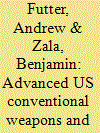

|
|
|
|
|
| Publication |
2013.
|
| Summary/Abstract |
The Obama administration has made a great effort to increase the role of advanced conventional weaponry in US national security thinking and practice, in part to help reinvigorate the global nuclear disarmament agenda by reducing the role played by nuclear weapons in the US defense posture. However, such a strategy is fundamentally flawed because increases in US conventional superiority will exacerbate US relative strength vis-à-vis other powers, and therefore make the prospect of a nuclear weapon-free world seem less attractive to Washington's current and potential nuclear rivals. Consequently, it is highly likely that the impact of efforts to increase US advanced conventional superiority through ballistic missile defense and a conventional "prompt global strike" program will ensure that the Obama administration is adopting a pathway to nuclear abolition on which it is the sole traveler for the foreseeable future.
|
|
|
|
|
|
|
|
|
|
|
|
|
|
|
|
| 2 |
ID:
118375


|
|
|
|
|
| Publication |
2013.
|
| Summary/Abstract |
Latin American countries have historically followed different paths and logics toward the nonproliferation regime. Some states have unconditionally advocated for global and nonproliferation efforts, while others have vehemently opposed such measures or remained ambivalent toward the regime itself. By historically comparing two of Latin America's most influential countries-Brazil and Mexico-this study identifies the underlying domestic conditions and external influences that explain their differences in behavior and policy toward the nonproliferation regime. Because little is known about the reasons why different Latin American countries adopt these different approaches, the purpose of this article is to resolve this problem, primarily by focusing on the ways in which evolving civil-military relations and US influence have shaped nonproliferation policy preferences in Latin America. It concludes with a discussion of how these historical cases might shed light on current nonproliferation policies in Latin America.
|
|
|
|
|
|
|
|
|
|
|
|
|
|
|
|
| 3 |
ID:
118377
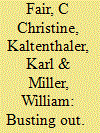

|
|
|
|
|
| Publication |
2013.
|
| Summary/Abstract |
This report explores Iranian popular opinion on the Treaty on the Non-Proliferation of Nuclear Weapons (NPT) and the determinants of Iranian attitudes. Using data from a 2008 survey of 710 Iranians administered by the University of Maryland's Program on International Policy Attitudes, we find that that a significant minority of Iranians (10 percent in 2006 and 14 percent in 2008) would prefer that Iran withdraw from the NPT. Our statistical analysis shows that Iranians who fear a US attack on Iranian nuclear facilities and distrust the International Atomic Energy Agency are more likely to want to quit the NPT. We therefore argue that those who do not trust other nations are most likely to oppose the NPT.
|
|
|
|
|
|
|
|
|
|
|
|
|
|
|
|
| 4 |
ID:
118374


|
|
|
|
|
| Publication |
2013.
|
| Summary/Abstract |
This theoretical analysis explores which countries might constitute the next generation of nuclear proliferators, using Venezuela as a case study of one of the possible next nuclear weapon states. Three alternative theoretical frameworks or models are used to analyze the preconditions that might or might not drive Venezuela to pursue nuclear weapons in the near future. This study finds that there is little evidence to support the alarmist claims surrounding a future Venezuelan nuclear weapons program. These findings are important for both devising an accurate US national security strategy for identifying and combating the next generation of proliferators and also for implementing effective policies for the future of US-Latin American relations.
|
|
|
|
|
|
|
|
|
|
|
|
|
|
|
|
| 5 |
ID:
118373
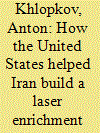

|
|
|
|
|
| Publication |
2013.
|
| Summary/Abstract |
In the spring of 1975, Iran became one of the first states to begin comprehensive research into using lasers for uranium isotope separation. As part of that research, the government sought the expertise of Jeff Eerkens, a leading American specialist in the field. This investigative article tells the story of their relationship: how it began, how it developed, and how it ended, drawing extensively from the authors' personal interviews with Eerkens as well as numerous publications and other interviews.
|
|
|
|
|
|
|
|
|
|
|
|
|
|
|
|
| 6 |
ID:
118378
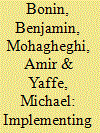

|
|
|
|
|
| Publication |
2013.
|
| Summary/Abstract |
The goal of establishing a Middle East weapons of mass destruction-free zone (WMDFZ) is shared in principle by all governments in the region. Political and strategic realities continue to make achievement of that goal elusive. For the past three years, the authors have participated in track-two discussions on the technical implementation parameters of a zone. The discussions brought together policy and technology experts from throughout the region, with an initial focus on biological arms control challenges. The interactions have yielded important insights, not only on specific technical issues, but also on how regional and global policy-making communities might move forward on advancing the broader WMDFZ question. This report provides an overview of the discussions, including the authors' insights and recommendations.
|
|
|
|
|
|
|
|
|
|
|
|
|
|
|
|
| 7 |
ID:
118372
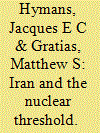

|
|
|
|
|
| Publication |
2013.
|
| Summary/Abstract |
This article clarifies and evaluates the intellectual underpinnings of the respective military red lines that Western leaders have drawn against Iran's developing nuclear program: (1) the red line of "no Iranian nuclear weapon"-the stance that has been embraced by President Barack Obama- and (2) the red line of "no Iranian nuclear weapons capability"-the stance that has been embraced by Israeli Prime Minister Benjamin Netanyahu and many prominent American Iran hawks. We contend that the key intellectual divide between these stances is that the Netanyahu view implicitly assumes that a "significant quantity" (SQ) of highly enriched uranium is essentially equivalent to a bomb because an explosive nuclear test is technically unnecessary, whereas the Obama view implicitly assumes that if and when Iran gets to the point of being technically and psychologically ready to assemble a nuclear weapons arsenal, it will conduct a test. We show through theoretical and empirical analysis that the likelihood that Iran will choose an "Israeli-style" policy of creating an arsenal of untested but operational nuclear bombs is very low. Therefore, Obama's red line is more intellectually defensible than Netanyahu's.
|
|
|
|
|
|
|
|
|
|
|
|
|
|
|
|